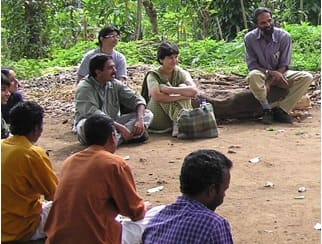
Networks focusing on ICCAs–territories of life
Networks focusing on ICCAs– territories of life are formal or informal groups of communities, organizations and individuals that decide to collaborate on relevant practices and policies of common concern.[1] For instance, diverse organizations and individuals may create an informal working group to share experiences about their territories of life and pool resources to understand and act upon a topic of common interest. Several communities may create a formal federation or association of custodians of territory of life and other allies to advocate for a change in policy that concerns them all. Or an existing federation of indigenous peoples may create a committee to pull together all those ready to act about policies to provide territories of life with effective backing and support. While a working group or a committee may be flexible and relatively informal, dedicated associations or federations are usually more formal and need to fit national legal requirements.
Coalitions and platforms are other important forms of network, usually created with a specific goal in mind and focused on one or more specific territories of life. Such coalitions are especially useful for addressing pressing issues, such as opposing a dam or mining project, but could continue after the primary goal is achieved to take care of underlying issues, such as lack of recognition of customary land and natural resource rights in the relevant watershed.
The available human and organizational capacities inform the types of territory of life networks that are possible and desirable in any given context. In general, however, networks at national level are particularly useful to engage in advocacy for legislation and policy that appropriately recognises and supports ICCAs—territories of life (see #Appropriate recognition; #Appropriate support). Another crucial role for such national or sub-national networks is the provision of peer-support and peer-review for thesubmission of data to a National Registry of territories of life and/or to the international databases and registries hosted by WCMC. In association with the ICCA Consortium, WCMC has recommended that community custodians organise their own networks to provide data comparability and quality control.
At the end of 2019, networks focusing on ICCAs– territories of life exist in more than 30 countries, and peer-support and peer-review processes are functioning in countries as diverse as Spain, the Philippines, Iran, Ecuador and China.[2]
Key reference:
Borrini-Feyerabend and Campese, 2017. See also: www.iccaconsortium.org
[1] The role of networks in the politics of self-determined territoriality is powerfully illustrated and analyzed in Escobar, 2008.
[2] For on-going reports about the networks focusing on ICCAs–territories of life, see the yearly report on the work of the ICCA Consortium available from the Consortium main web site: www.iccaconsortium.org.